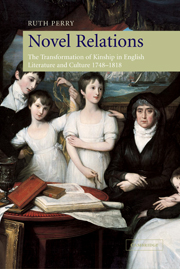Book contents
- Frontmatter
- Contents
- Acknowledgments
- Introduction
- 1 The great disinheritance
- 2 Fathers and daughters
- 3 Sister-right and the bonds of consanguinity
- 4 Brotherly love in life and literature
- 5 Privatized marriage and property relations
- 6 Sexualized marriage and property in the person
- 7 Farming fiction: Arthur Young and the problem of representation
- 8 The importance of aunts
- 9 Family feeling
- Bibliography
- Index
Introduction
Published online by Cambridge University Press: 22 September 2009
- Frontmatter
- Contents
- Acknowledgments
- Introduction
- 1 The great disinheritance
- 2 Fathers and daughters
- 3 Sister-right and the bonds of consanguinity
- 4 Brotherly love in life and literature
- 5 Privatized marriage and property relations
- 6 Sexualized marriage and property in the person
- 7 Farming fiction: Arthur Young and the problem of representation
- 8 The importance of aunts
- 9 Family feeling
- Bibliography
- Index
Summary
What Goddess, or what Muse must I invoke to guide me through these vast, unexplored regions of fancy? – regions inhabited by wisdom and folly, – by wit and stupidity, – by religion and profaneness, – by morality and licentiousness.
Clara Reeve, The Progress of Romance, p. 109.If you think about it, the wreckage of families in the novels of Jane Austen is unnerving. In the novels of her sister authors it is appalling. These women – Charlotte Smith, Mary Wollstonecraft, Fanny Burney, Maria Edgeworth, among the less obscure ones – describe what was to them a terrifying shift in their society's concept of the family, a profound change that marks the difference between the world of Grandison, the world they had lost, and the world in which unhappily they found themselves adrift.
Edward Copeland, “The Burden of Grandison,” pp. 98–9.… the family will be studied less for its own sake, as an isolated phenomenon of historical social structure – a statistical mean household size – but rather as an important and still poorly fathomed intermediary between economic change and its qualitatively experienced effects, as for example on social relations.
K. D. M. Snell, Annals of the Labouring Poor, p. 332.This book is about how family relationships were represented in eighteenth-century English fiction and what those representations tell us about changes in actual families in that period.
- Type
- Chapter
- Information
- Novel RelationsThe Transformation of Kinship in English Literature and Culture, 1748–1818, pp. 1 - 37Publisher: Cambridge University PressPrint publication year: 2004

